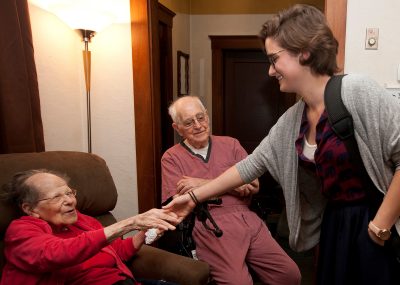During a global pandemic in which elder populations are among those most compromised, local care services have stepped up protective measures for both their consumers and the workers who serve them. If you are looking for assisted living options visit Townehall Place – Assisted Living.

Bedford-based Mass Home Care has continued to deliver in-home services to seniors and disabled individuals through the COVID-19 epidemic. Its members first began discussing the threat in early February, according to Executive Director Lisa Gurgone.
The home care service already has a system in place for emergency situations. Since 2011, a nurse has assigned each client a risk level from one to four — with ones being most in need of attention during an emergency — as soon as they enroll.
“When these emergency situations happen, if you only have 10 workers that will go out and you have 30 clients, how do you decide which 10 consumers get the services?” Gurgone said. “So we had to start prioritizing them by risk.”
Those with higher risk levels tend to get more hours of service: a caregiver will likely visit multiple times a week to bathe them, prepare meals and do laundry on top of shopping and picking up medications. Meanwhile, a level four client might see a homemaker come in once a week.
The system was originally intended to tackle short-term crises such as snow storms or hurricanes, Gurgone said. The current emergency, the coronavirus, was an unexpected one.
“We never anticipated such a long period of [emergency], quite honestly,” Gurgone said.
Gurgone said all employees are also screening themselves daily in accordance with Massachusetts Department of Public Health protocol, reporting every morning whether they have any symptoms, such as dry cough or fever.
“We’re calling consumers before we go out and asking the same questions to make sure that the consumers aren’t having any symptoms,” Gurgone said. “It’s not foolproof, but at least we’re screening everyone at both ends.”
Caregivers are also washing their hands more often and wearing gloves in efforts to maintain meticulous hygiene while serving clients in their homes.
The most challenging part of handling the pandemic, Gurgone said, has been the fear emanating from their elderly clients.
“We have not seen workers calling out. Workers want to work, they want to provide the care that people need,” Gurgone said. “But what we are seeing is that a lot of older adults are canceling services because they are afraid that a worker would bring coronavirus into their home.”
Gurgone said she respects the autonomy of those who choose not to receive services for one or two weeks. But past that, she begins to worry about seniors not accessing the care they normally rely on, especially if it will be for weeks or months on end.
“So our meals drivers are delivering and we want people to keep taking meals,” Gurgone said. “I don’t want people to be afraid to take meals from us, because many people don’t have other ways to get food.”
Several clients are no longer comfortable receiving hands-on care, oftentimes baths, and yet are unable to do the task themselves — which means they ultimately will not be bathing on a regular basis.
For individuals who currently refuse this kind of assistance, Gurgone said employees will instead ask to provide other services. Workers will simply drop a meal off, or check in by coming in to do some light housekeeping while the client remains in a separate room.
“For a lot of these people, that home care service is the only person they talk to on a daily basis, on a weekly basis,” Gurgone said, “so not having anyone check on them for multiple weeks at a time, I think, can be very scary.”
Caregivers have been reaching for the telephone more often in efforts to make sure each client has someone to interact with every day. This way, Mass Home Care aims to curb the social isolation that might set in in elderly clients who live alone.
Nursing and assisted living homes in the state have also been implementing new precautions in response to the viral outbreak.
Seated in Dorchester, Saint Joseph Rehabilitation and Nursing Center has closed its building to all visitors without exception. All staff are screened upon entrance and must have their temperature taken, a spokesperson said.
The nursing center has also exerted significant effort to increase its supply of personal protection equipment, in addition to ordering extra food and linens. Vendors, however, must now drop off any packages at the door.
While recent circumstances made many residents feel anxious, according to the spokesperson, one way they tend to alleviate unease is through regular contact with family members via phone calls or Skype.
Also taking increased caution is Hale House, an assisted living home in Back Bay serving retirees aged late 50’s to mid-90’s.
Most of its residents have some physical or mental disability that hinders their ability to live alone, Executive Assistant Judith Wilburn wrote in an email. These clients rely on Hale House for “every aspect of living.”
All relatives and volunteers are for now prohibited from entering the premises, she wrote. Routine care, such as haircuts and podiatry, has been suspended as well. However, residents are still allowed to leave their Hale House although it is not recommended they do so.
“[Residents] are free to leave the home, but we are actively discouraging that now, and asking that they take sanitation steps upon their return if they do leave the building,” Wilburn wrote.
The home also discourages residents from congregating. In congruence with social distancing efforts, they now eat in staggered seating and interact a “generous” distance apart from one another.
“At this point they are edgy and a little frustrated, but grateful that they are being well [cared] for,” Wilburn wrote.




























































































































